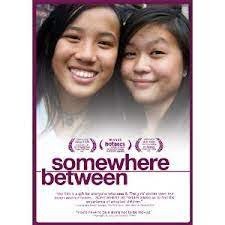 Reviewed by Rosemarie Leenerts, Library Assistant
Reviewed by Rosemarie Leenerts, Library Assistant
Imagine being “a child stuck between two countries,” which is the way one young woman, Fang “Jenni” Lee, puts it in the 2011 documentary Somewhere Between.
As a way to prepare her own adopted toddler daughter for what may lie ahead, producer-director Linda Goldstein Knowlton spent three years filming four teenaged girls adopted from China but raised in various parts of the United States. The result was this documentary.
The girls’ lives are parallel in many ways and even intertwine, but the stories are as unique as the young women themselves. All were adopted from China when the one-child policy was in place. Initiated in 1979, this policy was a way for China to reduce its bulging population, forcing couples to limit their number of offspring. As a result, 175,000 children were abandoned and then adopted by people in 26 countries. Around 80,000 of those children found homes in the United States.
Because Chinese males were more valuable to the family structure and society—oftentimes being educated while girls were not and then relied on to contribute to their families economically through jobs or by managing the family’s property—many of the children left on streets or at the steps of orphanages were girls. This is the story of four of them.
We first are introduced to Fang, who lives in Berkeley, California, with her Asian American father and white mother. To be able to communicate with her new daughter, Fang’s mother studied Mandarin for a year, becoming fluent in the language by the time she and Fang, age 5, met.
We also meet Jenna Cook, a 15-year-old living with her adoptive family in Newburyport, Massachusetts; Ann Boccutti, 14, from Lansdale, Pennsylvania; and Haley Butler, the youngest teen featured, living in Nashville, Tennessee.
All of the girls in the film have assimilated into American middle-class culture. Some are the only Asian kids in their schools, while others have siblings who also were adopted from China. The girls all retain an interest in knowing more about where they came from, both in terms of geography and family. With the help of their American parents, they return to China often to soak in the culture and even search for their birth families.
The stories are deeply moving, especially when one teen has an excellent lead on locating her birth mother and father in a small, poor village. Another story revolves around one of the teens who, eager for even a hint at locating her roots, asks the locals in whatever village she happens to be in if she resembles people in that minority group. She often is told she does, even though some of the villages are far apart. Fluent in Mandarin and not the local dialects, she finds the way she communicates makes her stand out as someone who doesn’t belong even in the country of her birth, a similar way she feels in the States by not looking like everyone else here.
Though the film project was begun as one woman’s exploration of what it means to be a part of two separate worlds, Somewhere Between is so much more than that. Equally heartwarming and profound, the film may make you question whether removing a child from her birthplace to give her a chance at a “better” life–as noble as that is–erases a part of her at the same time. 
In honor of Asian American and Pacific Islander Heritage Month, reserve and check out Somewhere Between or one of the other titles in our collection featuring the Asian American and Pacific Islander experience, including:
- Born a Healer, by Chunyi Lin: The autobiography of the renowned founder of Spring Forest Qigong, Chunyi Lin, from his tumultuous childhood to becoming a meditative healer
- Cross-Cultural Medicine, by Judyann Bigby: A treatise for why medical professionals need a deeper understanding of people’s cultural backgrounds in order to avoid misunderstandings and to provide optimum care
- The Farewell (DVD, rated PG): A heartfelt yet funny story focusing on a Chinese American woman and her beloved grandmother in China, who may have a terminal disease
- Ms. Purple (DVD, rated R): A 2019 film about a karaoke hostess living in L.A.’s Koreatown who must reunite with her estranged brother to care for their dying father
- Racial Profiling, by Alison Marie Behnke (ebook): A nonfiction book exposing how racial profiling is grounds for suspecting someone of an offense
- Saving Face (DVD, rated R): A young Manhattan doctor takes in her pregnant middle-aged mom, whom she tries to keep her sexuality from while also trying to find her mother a husband.
- A Scarf for Keiko (ebook, picture book): In 1942, a friendship between Keiko, a Japanese American young girl, and her friend is tested in the wake of the Japanese bombing of Pearl Harbor.

